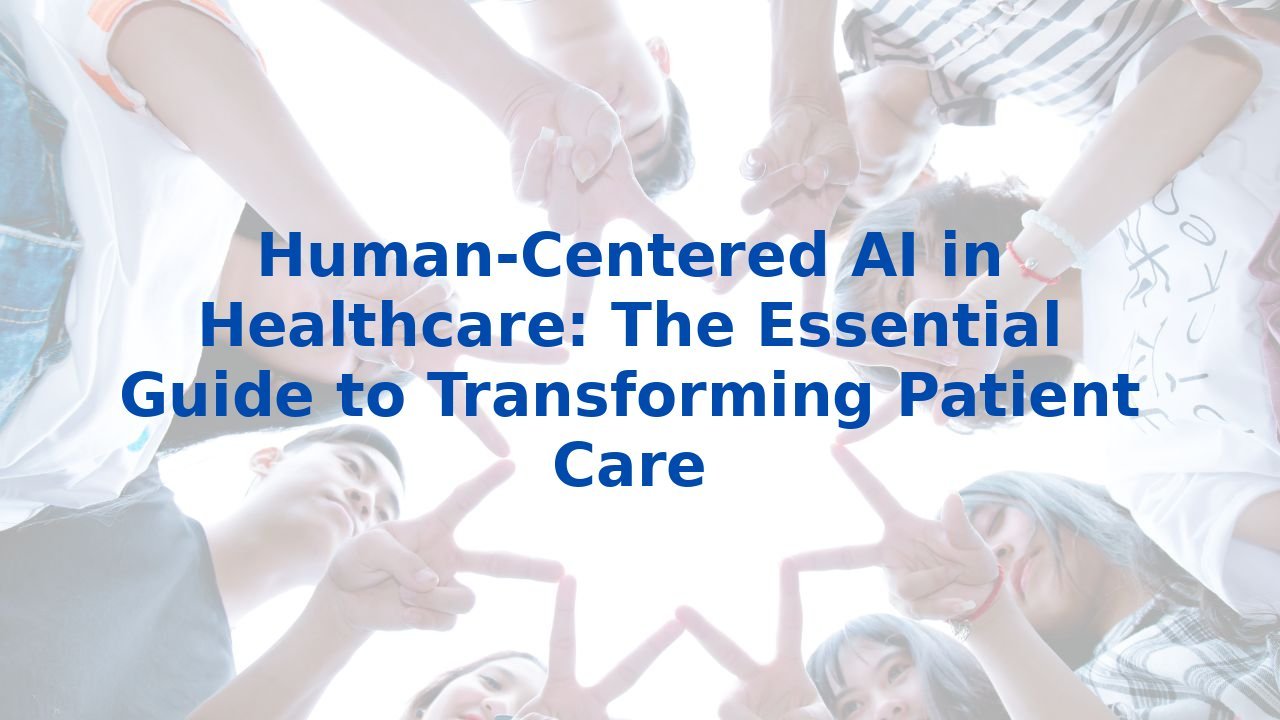Human-Centered AI in Healthcare: The Essential Guide to Transforming Patient Care
Human-Centered AI in Healthcare: The Essential Guide to Transforming Patient Care
Introduction
In today’s healthcare landscape, integrating Artificial Intelligence (AI) isn’t just an option; it’s an imperative. However, the seismic shift that AI brings forth isn’t merely about advanced algorithms or computational prowess. Instead, it revolves around fostering an approach that places human needs at the forefront—commonly referred to as Human-Centered AI (HCAI). This transformative methodology is reshaping patient care, making it more accessible, personalized, and equitable.
The Benefits of Human-Centered AI
Enhancing Accessibility
AI holds the promise of drastically improving healthcare accessibility. By automating mundane, routine tasks, AI liberates healthcare professionals, allowing them to channel their energy into compassionate patient care. Imagine an AI system that assists with patient scheduling, ensuring timely access to essential services. Moreover, consider how AI can assist radiology technicians in selecting appropriate imaging exams, minimizing unnecessary rescans and improving overall workflow efficiency.
Personalization
At the core of HCAI lies the capacity for personalized care. AI-driven systems that amalgamate patient data with cutting-edge medical insights can craft treatment modalities tailored specifically to individual needs. For instance, an AI model analyzing a patient’s electronic health records (EHR) and contemporary medical research can provide a treatment recommendation maximizing efficacy while minimizing adverse side effects. This level of personalization is not just advantageous; it revolutionizes the patient experience.
Equity and Efficiency
Human-Centered AI also addresses the pressing issue of equity within healthcare. Through a conscious effort to identify and rectify biases present in the AI lifecycle, HCAI seeks to ensure that all patients, regardless of background, receive fair and equitable care. This approach significantly mitigates health disparities, promoting a system that benefits the entire patient population.
How AI Enhances Healthcare Processes
Data Analysis and Decision Support
The ability of AI technologies to process and analyze massive datasets is unparalleled. With this capability, AI systems can discern patterns that may go unnoticed by human eyes—an invaluable asset for predicting health conditions prevalent within specific populations. For instance, through predictive modeling, AI can flag patients with diabetes who are at heightened risk for developing diabetic retinopathy, a critical complication that can lead to blindness.
Workflow Optimization
Optimizing workflows is another arena where AI can make a considerable impact. From patient scheduling to diagnostic processes, AI can facilitate operational efficiencies. For example, preliminary analyses of CT scans can be automated, enabling AI to identify concerning cases that necessitate swift follow-up. By streamlining these workflows, healthcare professionals are empowered with pertinent information, enhancing their decision-making capabilities.
Communication and Collaboration
Lastly, AI enhances communication between patients and healthcare providers. By taking over routine tasks, AI ensures that pertinent information is readily available, fostering transparent dialogues that can improve patient outcomes. A recent study showed that a staggering 83% of patients cited poor communication as a major downside of their healthcare experience. By alleviating these issues, AI can bridge gaps in communication, paving the way for better healthcare relationships.
The Importance of Employee Training
While AI brings transformative benefits to the healthcare sector, the pivotal role of employee training cannot be overstated. The effective integration of AI into healthcare necessitates that professionals understand how to engage with these technologies. Training should focus not only on the operational aspects of AI but also its limitations. By educating healthcare teams on the nuances of AI, organizations ensure that they can leverage these tools for optimal patient care. Adopting a thoughtful training approach aligns perfectly with AI’s rapid evolution, equipping healthcare professionals to navigate this changing landscape adeptly.
Conclusion
The journey of integrating Human-Centered AI into healthcare heralds a new era of patient care characterized by accessibility, personalization, and equity. By prioritizing human values, HCAI safeguards the essence of healthcare professionals while amplifying their capabilities. As we tread further into a future powered by humane technology, we can aspire to a system that transcends current complexities, fostering deeper connections between patients and providers, ultimately elevating the human experience in healthcare.
If you are interested in equipping your workforce with essential AI skills, explore various training programs to help adapt to this technological shift.



